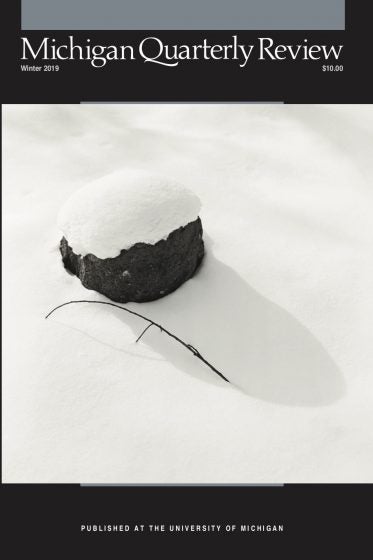“The Funeral Tourist,” by Andrew J. Skerritt, appears in the Winter 2019 Issue of MQR.
Everyone who leaves home and visits another place or country for any purpose other than business is considered a tourist. If you are a native of a Caribbean island but live in New York or London, when you return to your native island for Christmas, you are classified as a tourist. And if you have any illusions otherwise, then the way your friends and family treat and dismiss you, politely, of course, as if you are only visiting, as if anything you say or do has only temporary validity, that further marks you as a tourist. Caribbean islands have long been magnets for European tourists; they come to enjoy the warm weather and the plantation hospitality, only to return home to write about the peculiarities of the natives. Mass migrations to England in the fifties and early sixties, and a steady brain drain to the United States and Canada in the decades after that, created another type of tourist, the colored type: the economic, political, and cultural exile returning for summer vacation or Easter or Christmas holidays.
Then there is festival tourism. Think Carnival, New Orleans, Trinidad & Tobago, or Brazil in February; or Saint Thomas in the Virgin Islands, in the summer; or the Saint Lucia Jazz Festival. Or the Montserrat Calabash Festival or the Saint Patrick’s Week festivities, which aren’t about being Irish as some mistakenly believe. They honor a failed slave rebellion planned for March 17, 1768, but after a long winter, the real purpose is to give expats an excuse to inject money into the local economy by spending Yankee dollars and British pounds to hire a taxi cab driver, order a few rounds of drinks at local bars, shop for souvenirs to take back as gifts. Lately, the phrase “space tourism” has crept into the lexicon, racing toward the next frontier—an in- finite playground for billionaires willing to pay private companies to launch them into gravity-less space and bring them back to terra firma.
You also must have heard of wedding tourism. That half of American marriages fail doesn’t deter young couples from jetting off to exotic beaches in Acapulco, Mexico, and Ocho Rios, Jamaica, for dream weddings. Their all-white nuptials lend a mythic air to the proceedings. Who cares about an unhappy marriage as long as the wedding was joyous?
*
An exile is a funeral tourist separated by a phone call from home. For the foreigner—the political, economic, and emotional exile—grief is a way of life. And that life, André Aciman reminds me, is a constant quest to connect the present with the past as seamlessly as possible. In False Papers Aciman says that “foreigners look for their homeland abroad, to bridge the things here to the things there, to rewrite the present so as not to write off the past.” My grandmother is my past. Her death is my present. A journey to her funeral is necessary to close this chapter. For the funeral tourist, home is no longer home even if he calls it home. Home has become transmutable, like a fungible substance, a four-letter word used with fondness and sentimentality yet lacking in authenticity. For the funeral tourist, home is where the dead rests; but he cannot, unlike Jesus, implore the dead to bury their dead. For the dead is his dead and to abdicate his responsibility is to leave a hole in his soul, like the roof damaged in a hail storm and patched with tarpaulin.
*
“Every native of every place is a potential tourist; and every tourist is a native of somewhere,” Jamaica Kincaid writes. One thing that sets the funeral tourist apart is that he is usually a native of the place he visits. And so Kincaid could have said that every native in exile is a potential funeral tourist, for the time comes when he must return to his native land to bury his dead—grandfather, grandmother, mother or father, in no particular order. There’s a randomness to the decline and collapse; often the younger goes ahead of the older: brothers before fathers, sons before grandmothers, the healthy before the sickly….
Purchase MQR 57:5 or consider a one-year subscription to read more. This essay appears in the Winter 2019 Issue of MQR.






